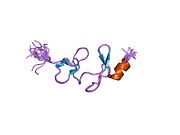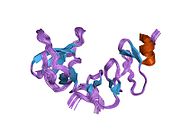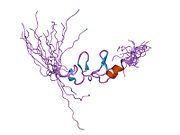LIMS1
LIM and senescent cell antigen-like-containing domain protein 1 is a protein that in humans is encoded by the LIMS1 gene.[5][6][7]
Function
The protein encoded by this gene is an adaptor protein which contains five LIM domains, or double zinc fingers. The protein is likely involved in integrin signaling through its LIM domain-mediated interaction with integrin-linked kinase, found in focal adhesion plaques. It is also thought to act as a bridge linking integrin-linked kinase to NCK adaptor protein 2, which is involved in growth factor receptor kinase signaling pathways. Its localization to the periphery of spreading cells also suggests that this protein may play a role in integrin-mediated cell adhesion or spreading.[7]
Interactions
LIMS1 has been shown to interact with Integrin-linked kinase[6][8] and NCK2.[6][9]
References
- ^ a b c GRCh38: Ensembl release 89: ENSG00000169756 – Ensembl, May 2017
- ^ a b c GRCm38: Ensembl release 89: ENSMUSG00000019920 – Ensembl, May 2017
- ^ "Human PubMed Reference:". National Center for Biotechnology Information, U.S. National Library of Medicine.
- ^ "Mouse PubMed Reference:". National Center for Biotechnology Information, U.S. National Library of Medicine.
- ^ Rearden A (Aug 1994). "A new LIM protein containing an autoepitope homologous to "senescent cell antigen"". Biochem. Biophys. Res. Commun. 201 (3): 1124–31. doi:10.1006/bbrc.1994.1822. PMID 7517666.
- ^ a b c Tu Y, Li F, Goicoechea S, Wu C (Mar 1999). "The LIM-only protein PINCH directly interacts with integrin-linked kinase and is recruited to integrin-rich sites in spreading cells". Mol. Cell. Biol. 19 (3): 2425–34. doi:10.1128/mcb.19.3.2425. PMC 84035. PMID 10022929.
- ^ a b "Entrez Gene: LIMS1 LIM and senescent cell antigen-like domains 1".
- ^ Zhang Y, Chen K, Guo L, Wu C (Oct 2002). "Characterization of PINCH-2, a new focal adhesion protein that regulates the PINCH-1-ILK interaction, cell spreading, and migration". J. Biol. Chem. 277 (41): 38328–38. doi:10.1074/jbc.M205576200. PMID 12167643.
- ^ Tu Y, Li F, Wu C (Dec 1998). "Nck-2, a novel Src homology2/3-containing adaptor protein that interacts with the LIM-only protein PINCH and components of growth factor receptor kinase-signaling pathways". Mol. Biol. Cell. 9 (12): 3367–82. doi:10.1091/mbc.9.12.3367. PMC 25640. PMID 9843575.
Further reading
- Tu Y, Li F, Wu C (1998). "Nck-2, a novel Src homology2/3-containing adaptor protein that interacts with the LIM-only protein PINCH and components of growth factor receptor kinase-signaling pathways". Mol. Biol. Cell. 9 (12): 3367–82. doi:10.1091/mbc.9.12.3367. PMC 25640. PMID 9843575.
- Scanlan MJ, Gordan JD, Williamson B, Stockert E, Bander NH, Jongeneel V, Gure AO, Jäger D, Jäger E, Knuth A, Chen YT, Old LJ (1999). "Antigens recognized by autologous antibody in patients with renal-cell carcinoma". Int. J. Cancer. 83 (4): 456–64. doi:10.1002/(SICI)1097-0215(19991112)83:4<456::AID-IJC4>3.0.CO;2-5. PMID 10508479.
- Velyvis A, Yang Y, Wu C, Qin J (2001). "Solution structure of the focal adhesion adaptor PINCH LIM1 domain and characterization of its interaction with the integrin-linked kinase ankyrin repeat domain". J. Biol. Chem. 276 (7): 4932–9. doi:10.1074/jbc.M007632200. PMID 11078733.
- Tu Y, Huang Y, Zhang Y, Hua Y, Wu C (2001). "A new focal adhesion protein that interacts with integrin-linked kinase and regulates cell adhesion and spreading". J. Cell Biol. 153 (3): 585–98. doi:10.1083/jcb.153.3.585. PMC 2190577. PMID 11331308.
- Zhang Y, Chen K, Tu Y, Velyvis A, Yang Y, Qin J, Wu C (2002). "Assembly of the PINCH-ILK-CH-ILKBP complex precedes and is essential for localization of each component to cell-matrix adhesion sites". J. Cell Sci. 115 (Pt 24): 4777–86. doi:10.1242/jcs.00166. PMID 12432066.
- Campana WM, Myers RR, Rearden A (2003). "Identification of PINCH in Schwann cells and DRG neurons: shuttling and signaling after nerve injury". Glia. 41 (3): 213–23. doi:10.1002/glia.10138. PMID 12528177.
- Gevaert K, Goethals M, Martens L, Van Damme J, Staes A, Thomas GR, Vandekerckhove J (2003). "Exploring proteomes and analyzing protein processing by mass spectrometric identification of sorted N-terminal peptides". Nat. Biotechnol. 21 (5): 566–9. doi:10.1038/nbt810. PMID 12665801.
- Velyvis A, Vaynberg J, Yang Y, Vinogradova O, Zhang Y, Wu C, Qin J (2003). "Structural and functional insights into PINCH LIM4 domain-mediated integrin signaling". Nat. Struct. Biol. 10 (7): 558–64. doi:10.1038/nsb938. PMID 12794636.
- Fukuda T, Chen K, Shi X, Wu C (2003). "PINCH-1 is an obligate partner of integrin-linked kinase (ILK) functioning in cell shape modulation, motility, and survival". J. Biol. Chem. 278 (51): 51324–33. doi:10.1074/jbc.M309122200. PMID 14551191.
- Bock-Marquette I, Saxena A, White MD, Dimaio JM, Srivastava D (2004). "Thymosin beta4 activates integrin-linked kinase and promotes cardiac cell migration, survival and cardiac repair". Nature. 432 (7016): 466–72. doi:10.1038/nature03000. PMID 15565145.
- Barrios-Rodiles M, Brown KR, Ozdamar B, Bose R, Liu Z, Donovan RS, Shinjo F, Liu Y, Dembowy J, Taylor IW, Luga V, Przulj N, Robinson M, Suzuki H, Hayashizaki Y, Jurisica I, Wrana JL (2005). "High-throughput mapping of a dynamic signaling network in mammalian cells". Science. 307 (5715): 1621–5. doi:10.1126/science.1105776. PMID 15761153.
- Dougherty GW, Chopp T, Qi SM, Cutler ML (2005). "The Ras suppressor Rsu-1 binds to the LIM 5 domain of the adaptor protein PINCH1 and participates in adhesion-related functions". Exp. Cell Res. 306 (1): 168–79. doi:10.1016/j.yexcr.2005.01.025. PMID 15878342.
- Xu Z, Fukuda T, Li Y, Zha X, Qin J, Wu C (2005). "Molecular dissection of PINCH-1 reveals a mechanism of coupling and uncoupling of cell shape modulation and survival". J. Biol. Chem. 280 (30): 27631–7. doi:10.1074/jbc.M504189200. PMID 15941716.
- Rual JF, Venkatesan K, Hao T, Hirozane-Kishikawa T, Dricot A, Li N, Berriz GF, Gibbons FD, Dreze M, Ayivi-Guedehoussou N, Klitgord N, Simon C, Boxem M, Milstein S, Rosenberg J, Goldberg DS, Zhang LV, Wong SL, Franklin G, Li S, Albala JS, Lim J, Fraughton C, Llamosas E, Cevik S, Bex C, Lamesch P, Sikorski RS, Vandenhaute J, Zoghbi HY, Smolyar A, Bosak S, Sequerra R, Doucette-Stamm L, Cusick ME, Hill DE, Roth FP, Vidal M (2005). "Towards a proteome-scale map of the human protein-protein interaction network". Nature. 437 (7062): 1173–8. doi:10.1038/nature04209. PMID 16189514.










